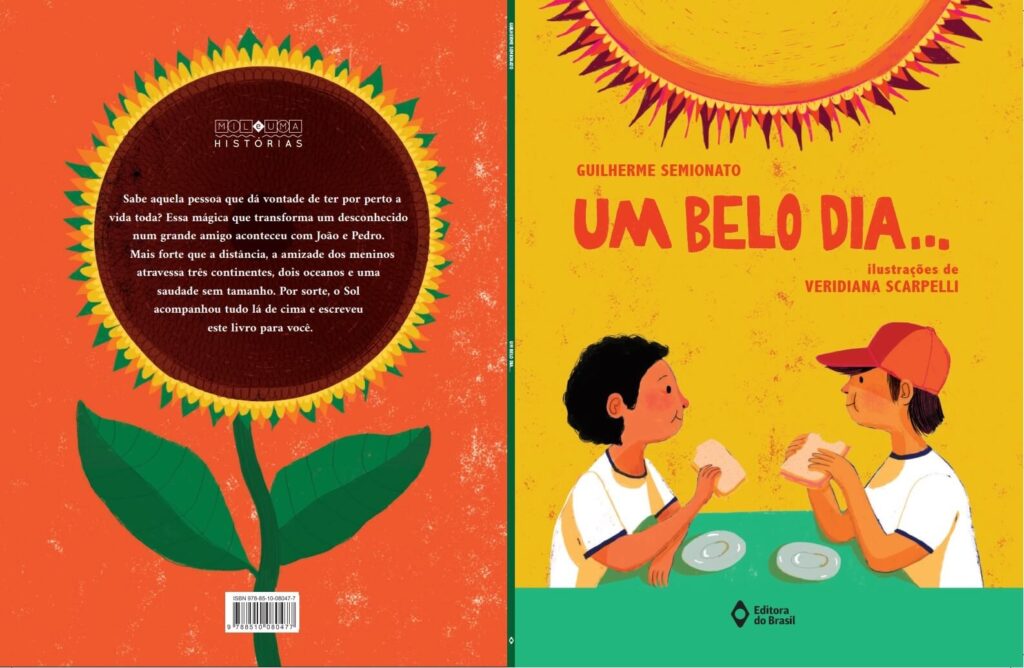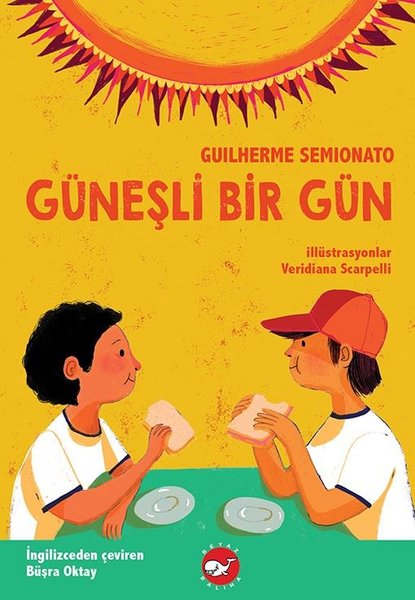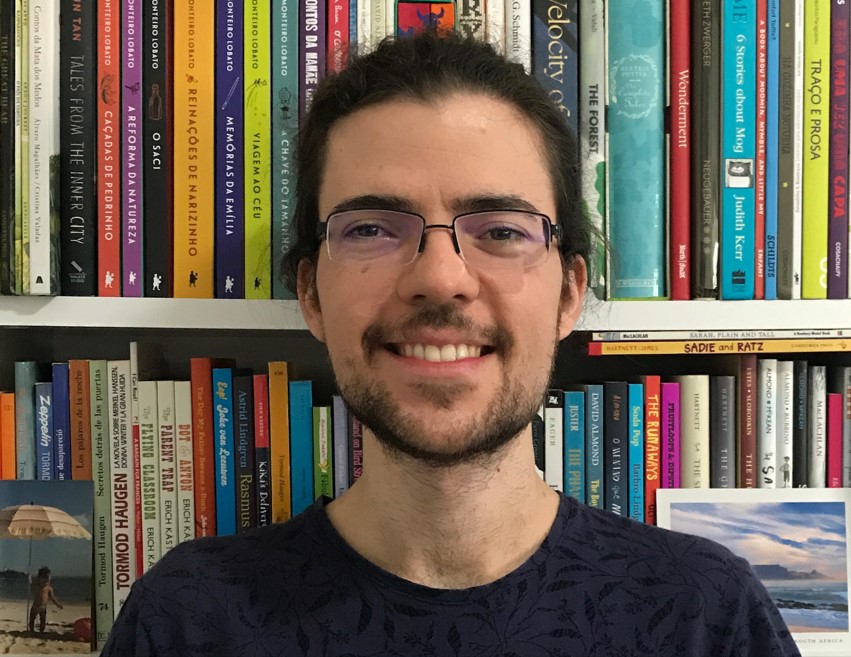We had a pleasant interview with Guilherme Semionato, author of youth and children’s books, about her literary life.
Hello. Could you briefly tell us about yourself?
Hi there. Thank you for taking your time to interview me. First of all, I’d like to extend my sympathies to the Turkish people, and that means you, because of the horrible, painful tragedy of February 6th. Whenever such a catastrophe happens, the world finds a way towards having a single and unified heart. And the heart of the world was broken that day.
I was born in the beautiful city of Rio de Janeiro, Brazil, in 1986. I received a B.A. in Social Communication from Federal University of Rio de Janeiro and a Specialist Degree in Literature for Children and Young Adults from Fluminense Federal University, one of the few programs dedicated to this field in my country.
As a children’s book author, I’ve written thirteen short stories (for younger and older children), three novellas and one novel (for older children) in Portuguese. I started writing stories for children in 2015, but my career began in 2020. By the end of 2023, I’ll have five books published in Brazil and a few others originally published in other countries (Portugal and Mexico) or translated into foreign languages (like Turkish).
I love reading, films and art in general. I love drinking tea, walking by the sea, petting a cat. I love silence and music. And I love my work. I fight for it as if my life depended on it. It does, a bit.
How and when did you decide to write books for teenagers and children?
This is my favorite story to tell. Back in 2012, I was a poet, but I just wrote poetry because I enjoyed it, never wanting to publish anything. Around that time, my friend Pedro (to whom ONE FINE DAY is dedicated; Manoel was his cat and that’s why he’s in the story too) told me that my best poems, or the ones he liked the most, were the most playful ones, poems a child could read and could enjoy reading. He then told me about an award in Brazil, the biggest one we have for unpublished children’s manuscripts, Prêmio Barco a Vapor (Steamboat Award) and he said I should write a story and submit it to the prize. I didn’t do that for the 2013 and the 2014 editions. At that time I was studying and working to be a screenwriter, writing screenplays for TV and cinema. Things didn’t turn out too well on this front and in 2014 I was desperately searching for a new way of living. I always thought I’d live to be an artist, but at 28 I was running out of time. On January 16, 2015 I started writing ONE FINE DAY, which will always be the most important book of my career.
When I started writing a short story in the mythic and faraway voice of the Sun and brought this dear narrator of mine closer to the story I was going to tell, I could hardly guess (and at the same time I was absolutely sure) that I would be illuminating the rest of my days, the second part of my life. It’s no joke when I say I was born again in 2015 (even though it sounds silly or ridiculous). I was indeed born again in 2015. And I’ll say that again for anyone who wants to hear it, loud and clear, forever.

Your first book in Portugal, Signs of the Heart, received the 2018 Lusofonia Prize at the Trofa Lusophone Competition. Can you tell us about your book and the competition process?
Though Portugal is not my home country, my editor in Porto Editora (Portugal’s biggest publisher in general and in the school market too) gave me my first yes, in December 2018. My second yes came from Mexico. It’s a bit sad that only after having stories accepted for publication in two other countries, a Brazilian publisher agreed to publish ONE FINE DAY.
SIGNS OF THE HEART is an absolutely untranslatable book that I love very much. It’s about love and freedom and language. It’s the love story between two graphic signs of the word “heart” in Portuguese: “CORAÇÃO”. Cedilha (the sign below the “C” here: Ç) and Til (~) fall in love, get married, and their joyous union sparkles more love stories between the other letters: CC, OO and AA. It’s an untranslatable book because it deals specifically with the Portuguese language: sounds, syllables, and grammar. The characters are signs and letters and the book takes place in a dictionary!
This was the first award I won in my career; it was given by a city in Portugal. They accept children’s manuscripts from all the Portuguese-speaking countries and that includes Brazil and many African countries.
How does it feel to be an award-winning writer? Do you feel responsible to the reader?
Awards are important because they bring readers to a new author such as myself, but I haven’t won many of them. The most important one was the Barco a Vapor Award, the biggest prize for children’s manuscripts in Brazil (they receive more than 1,000 stories each year). I was a finalist in 2016 and 2017, and finally won it in 2020. I love this award because I wrote ONE FINE DAY in 2015 to send it to this prize. In a way, I’m a children’s writer because this prize exists!
Your children’s book, Güneşli Bir Gün, is on sale in Turkey. Can you tell us about this book and its publication process?
ONE FINE DAY is a friendship story set across the world — and narrated by the Sun ☼ — between two boys (and a cat) from Rio. When one of them moves to Russia and his adaptation to that winter wonderland is disastrous, what can the other do? What can the Sun, which shines so brightly in Rio and so dimly in Moscow, do to help?
It’s a story full of warmth even before it begins (the inspiring letter the Sun writes to the readers about the “world of stories”, which is our world) and after it ends (my biography text, written in the first person in the Brazilian book). It is all very inviting, tying together the extremes of a large, beautiful and diverse world with all the magical possibilities of the imagination.
The original title of the book was OUR FRIEND, THE SUN, but the publisher asked me to think of another title. I thought about a new title that has a double meaning in Portuguese (and also in English, Spanish and French): “One fine day” can either be a sunny, beautiful day (such is the Turkish title) or it can be like a famous expression that many people use when they’re telling a story, something like: “One fine day, I found a cat on the street and I brought him home”. So “one fine day” means something like “once upon a time”. I don’t think the Turkish language has that expression, sadly.
I don’t remember exactly what made me write a book in the Sun’s voice, to be honest. The experience of moving from one city to another happened to me up until I was 18 years old, because my father is from the Brazilian Navy. At the time I wrote the book, I was missing Pedro (the person who told me I should write a children’s book, remember?) and Manoel, his cat. So I kind of put it all together. My home town is in the book (Rio) and my favorite city (Cape Town) is too.

(Be careful because now there are a few spoilers!)
The trip to Cape Town is purely magical realism, which is so rich in Latin America’s culture. João wishes that his friend Pedro finds happiness, comfort and peace in Russia and that’s what he asks the shooting star. And João’s presence is the answer, so they will see each other one more (last?) time.
The day before that we see João having fun in Rio’s summer, swimming in the club, with not a care in the world. João only gets sad because he talks on the phone with Pedro, and Pedro can’t hide that he’s melancolic. I think Part 2 represents the full strength of Friendships in general, not only theirs, but the feeling of having a friend and rooting for your friend and wishing him/her the best things in life and knowing that someone somewhere will always want your happiness. João travels to Cape Town to offer that comfort to his friend Pedro. When we see the kids back in their homes, João is startled by his adventure, it’s almost as if it didn’t happen, and (while the text doesn’t say it with all the words) he cries when he sees his mother. He was overcome with emotion, he missed not only his mom but his friend as well. But Pedro arrives in Russia more than willing to give Moscow a second chance, and he wants to get to know the city where he will live for the next few years.
Pedro and João will always be friends; they’ll always have Cape Town in their minds and hearts. Cape doesn’t enable their friendship to carry on and it’s not the place in which this feeling is stronger. Their beautiful story together lives in each other’s heart, and they don’t need to see/visit/live close to each other to wish the best possible things for the other. I think their friendship is eternal, with or without the Sun’s help. And the trip to Cape Town symbolizes João giving up his happiness and joy in order to make his friend feel better. Pedro does feel better by the end of the book and João was responsible for that: not the Sun, not the shooting star Ermenegilda. It was always João. He’s a magnificent friend to Pedro, no?
Will Pedro and João ever see each other again? I don’t know if the Sun will provide another trip to Africa for them, but it’s not necessary, because best friends can’t be apart. Actually they’re just one ray of sunshine away from each other… (That’s the title of the German edition, by the way: ONE RAY OF SUNSHINE AWAY).
In which other countries has your book, Güneşli Bir Gün, been published?
Besides Brazil (2020), Germany (2022), Chile/Colombia (2023) and the UK (2023). I’m always trying to find more foreign editions for thıs story, so maybe this list will get bigger.
Will you have other books to be published in Turkey?
Beyaz Balina made an offer to acquire the rights of OUR BICYCLE, the book that won the Barco a Vapor prize. Nothing is certain yet, but hopefully the book will indeed be published in your country. Here’s the synopsis:
The book is narrated in the first person by Daniel, age 10; this is his first book. Daniel loves to draw and his favorite place is the stationery store in the neighborhood, where he finds a very expensive drawing kit with everything he has always wanted: crayons, oil pastels, markers, colored pencils, watercolor cakes… Such unreachable bliss! His family is struggling financially, his father left home recently, and, in the midst of this, Daniel’s reckless attitude involving an old, rusty bicycle that belongs to his father (a very important bicycle) gets the plot in gear. In the anguish of regret, he searches for a solution to make everything right again. Daniel’s path is full of allies (Pedro, his best friend, from a very rich family; Alberto, the owner of the stationery store) and family memories. What does this bicycle represent to his family, after all?
How do you evaluate children’s literature in Brazil?
We have an array of fine writers and illustrators in Brazil. Our market is still very dependent on schools, either private or public. Publishers earn a lot of money selling books to the government, which buys books to thousands of public schools throughout the country. Remember that Brazil is a gigantic country with 215 million people. Readership here is low, but children here are great readers, especially because it’s mandatory to send children to school (or educating them at home) and they’ll read at least a few books per year in schools.
It seems to me that the Turkish market translates much more children’s books than the Brazilian. My passion for children’s literature gave me a parallel career: I also recommend books to Brazilian publishers and translate them into Portuguese. Frog and Toad Are Friends came out in 2021 (Arnold Lobel’s first book here) and soon my translations of two picture books will be published: the Polish Kłopot [Trouble] (Iwona Chmielewska) and the French Le prince tigre [The Tiger Prince] (Chen Jiang Hong). Unfortunately the last two books haven’t been published in Turkey; Lobel’s book was published by Kelime (Sıkı Dostlar Kurbağa ve Murbağa).
What would you like to say to your Turkish readers?
I appreciate your time reading this interview and I’d definitely appreciate it even more that you read ONE FINE DAY. The success of this book in your country may result in more of my stories being translated into Turkish. I feel a deep sense of gratitude when someone takes his/her time to read one of my stories.
Many of my books feature my very favorite arc: a journey of self-improvement made by older kids (8-12) in a period of transition that can offer challenges as children start to embrace the approach of adolescence. In my books, kids can take the next step in their lives. But my interest doesn’t rely on major transformations and life-altering events, but those small steps kids around that age have to go through to grow a little bit more, to become a little bit more confident, to find their own voice and story. For other people, from others’ point of view (especially adults), it may not seem like that big a step, but for them, it’s a very big thing to be able to do this. I like to see my characters making that change. And I think when readers who are struggling with their own lives see this kind of story, that helps them get some courage, and it has meaning for them.
If ONE FINE DAY and OUR BICYCLE have any meaning for even 1 Turkish reader, then my work is worthy. Finally, I’m sorry again for the staggering losses the earthquake brought to your people.

















Be First to Comment